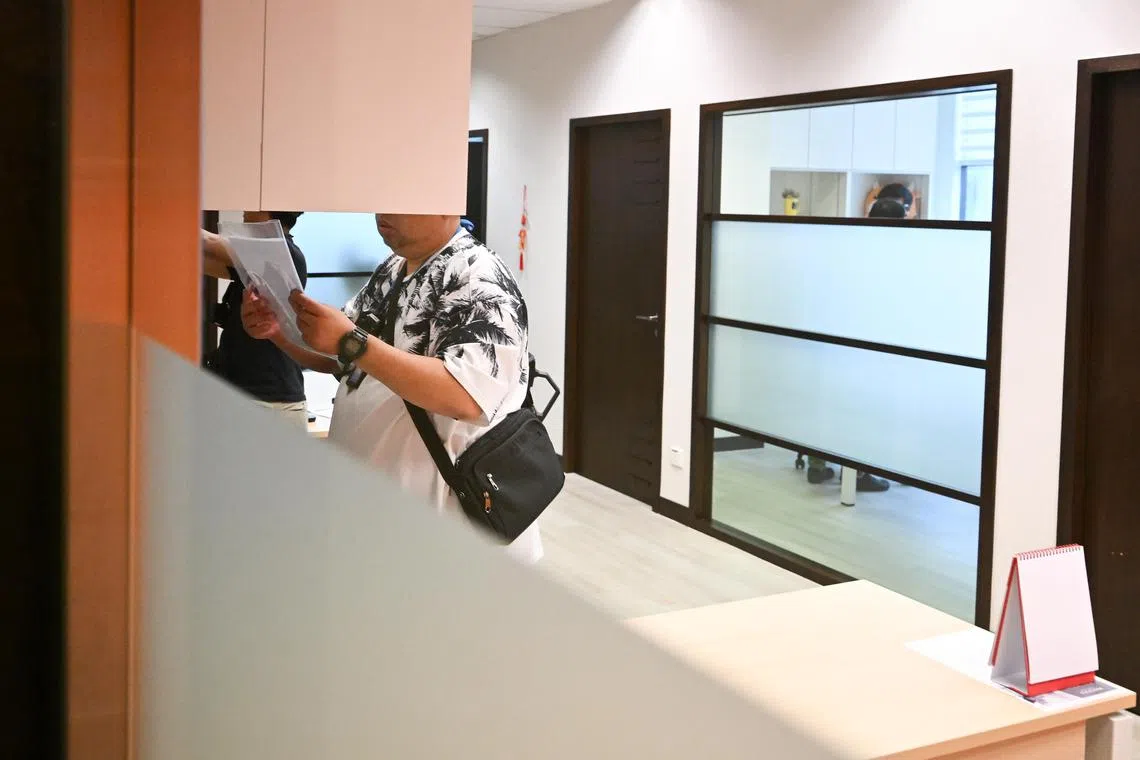Whistle-blowers claim spartan office in River Valley is front for major vape distributor; HSA monitoring
Sign up now: Get ST's newsletters delivered to your inbox

The office in Singapore does not store vape products.
ST PHOTO: LIM YAOHUI
Follow topic:
SINGAPORE – A “no-soliciting” sign hangs on the door of an office in River Valley, with neither signboard nor company name visible at the entrance, and rooms bare, save for a few tables.
It is registered as a holding company offering administrative services, but whistle-blowers have claimed it is actually the regional headquarters for one of the largest vaping companies in China.
The two whistle-blowers claimed employees of the firm in Singapore are aware of shipments to distributors in jurisdictions like Thailand, Laos and Cambodia, where vaping is banned.
Vaping has been banned in Singapore since 2018. It is illegal to buy, use or own an electronic vaporiser or vape here.
The office in Singapore does not store vape products. Employees allegedly use computers to coordinate the distribution of millions of dollars worth of vaping products to the region.
The items they purportedly help move to the South-east Asia region include e-liquids – the chemicals used in vaporisers.
The supplies are said to be from one of the largest producers of vaporisers in China, which sold more than 2.2 billion yuan (S$415 million) worth of vaping products in 2020 alone.
The whistle-blowers, who are based in China and work for the vape producer, said the office in River Valley was set up in 2019.
The two men had approached The Straits Times in November 2023, when they grew suspicious that they were being made to break laws in various jurisdictions.
They provided ST with secretly recorded conversations
The whistle-blowers said the Singapore office “manages the creation, management and furtherance of illegal operations throughout the Asia-Pacific, including, and not limited to, the architecting and strategy as to how to illegally import products from Malaysia into Singapore”.
They provided recordings, internal coded distribution lists, and chats on the Telegram messaging platform as proof.
The whistle-blowers claimed they had helped supply firms in Malaysia with nicotine-laced e-vaporisers when they were still banned in the country. The ban on nicotine-based products was lifted only in April 2023.
One of the whistle-blowers said: “We didn’t want to have any part in this illegal venture. But by keeping quiet, the company would just continue with its profitable work in this close-knit industry.”
They also said they coordinated the distribution of vaping products in New Zealand, where there are laws restricting the type of products that can be sold and distributed.
The whistle-blowers said they had also helped supply distributors in Thailand, where vaping has been banned since 2014, and in Britain, which limits the amount of nicotine used in products.
The recordings implied that bribes were paid in “difficult markets or markets with heavy and strict regulations”, such as Australia and New Zealand.
The firm in Singapore had advertised for staff on the MyCareersFuture Singapore website in 2022. It offered a monthly salary of up to $10,000 for associate directors.
The ad said the candidate had to have experience in “next-generation tobacco and nicotine products” and “understanding of regional flavour differences and preferences”.
ST contacted the two Singaporean senior managers identified by the whistle-blowers.
One of them confirmed that the office in River Valley runs regional operations for the Chinese vape company, but added that the foreign firm does not sell vapes in Singapore.
There are clues to show the link between the producer in China and the firm in Singapore.
A search of business records shows that the company in River Valley is owned by a firm in Hong Kong, which counts the chief executive of the Chinese vape producer as one of its directors.
The River Valley firm, which does not have a telephone landline, provided the landlord with an e-mail address that is traced back to the firm in China.
The vape company in China and the River Valley office have not responded to ST’s queries at press time.
Monitored firm
The Health Sciences Authority (HSA) said it has been monitoring the firm in Singapore.
“The HSA conducted two investigations into (the company at River Valley) in November 2023 and January 2024 following separate tip-offs alleging that the company was supplying e-vaporisers in Singapore.
“Thus far, HSA did not find any evidence that supported these allegations,” it said, adding that it takes a serious view on the illegal supply of e-vaporisers.
HSA added that it will continue to monitor the situation and take action against those who contravene the law.

Officers from Health Sciences Authority (HSA) raiding a global vaping company in River Valley on Jan 11, 2024.
ST PHOTO: LIM YAOHUI
The agency had previously noted an increase in the number of people caught using and possessing e-cigarettes.
In 2022, 4,916 people were caught for the offence compared with 1,266 in 2020, and 4,697 in 2021.
Figures for 2023 are not out yet but HSA said 1,656 e-vaporiser-related cases were detected in December 2023 alone.
Some of the offenders were caught at the ZoukOut 2023 dance music festival on Sentosa, while others were nabbed at Changi Airport and Tuas Checkpoint.
The agency said it will work with the Immigration and Checkpoints Authority to conduct operations at land and sea checkpoints in the coming months.
Buying, owning or using a vaporiser in Singapore can result in fines of up to $2,000.
First-time offenders who import, distribute, sell or offer for sale e-vaporisers and their components may be fined up to $10,000, jailed for up to six months, or both.

